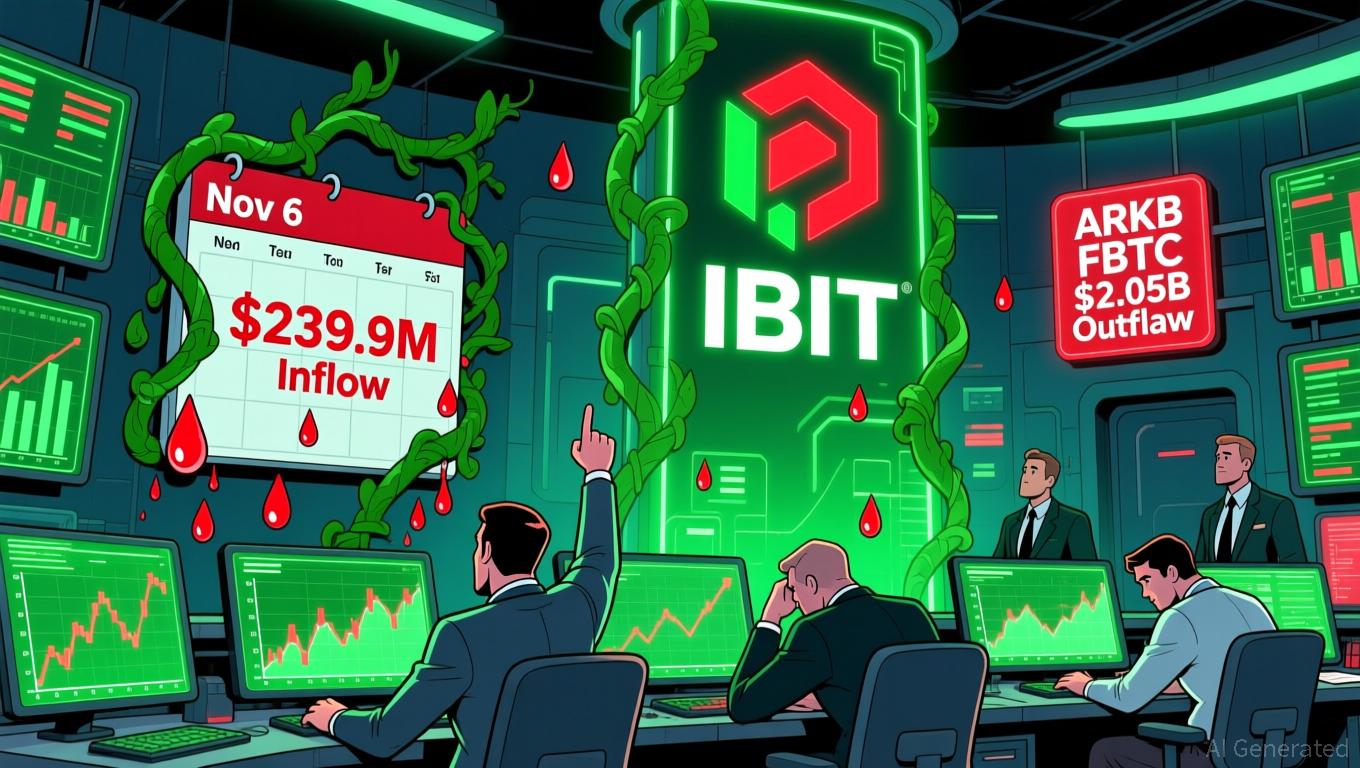U.S. Court Case Puts DeFi to the Test: Will Regulation Hinder Innovation?
- U.S. prosecutors challenge DeFi's "honest validator theory" in a $25M MEV bot trial, arguing blockchain loopholes enable market manipulation. - MEV bots exploit transaction ordering to siphon profits from traders, deterring institutional adoption due to manipulation risks. - A ruling against defendants could force stricter MEV regulations, reshaping DeFi protocols and global crypto compliance standards. - Institutional hesitation persists despite Bitcoin/Ethereum collateral moves, as MEV risks and regula
The U.S. court proceedings involving a $25 million MEV (maximal extractable value) bot have sparked intense legal and regulatory debate, highlighting the delicate balance between decentralized finance (DeFi) and established financial systems. Prosecutors are disputing the defense's dependence on unclear cryptocurrency regulations, asserting that profiting from blockchain loopholes amounts to both market manipulation and fraud. The case, which focuses on the Peraire-Bueno brothers, has the potential to reshape how U.S. law treats blockchain advancements, carrying significant consequences for DeFi’s trajectory and institutional involvement, according to a
The central issue in the trial is the prosecution’s dismissal of the “honest validator theory,” a defense argument claiming Ethereum’s decentralized structure makes fraud accusations invalid. Prosecutors argue that rearranging transactions to extract value—a standard MEV tactic—still breaches anti-fraud laws, regardless of the blockchain’s technical complexities, the Coinotag report states. This legal confrontation highlights a larger conflict: while DeFi promotes open innovation, its dependence on decentralized validators introduces regulatory gray zones now under intense scrutiny, as a

MEV bots, which profit by manipulating the order of blockchain transactions, have been a controversial aspect of DeFi for some time. By front-running trades or carrying out “sandwich attacks,” these bots extract value from both individual and institutional traders, often without detection. Aditya Palepu, CEO of DEX Labs, contends that such activities discourage financial institutions from engaging with DeFi, as they expose users to manipulation. “When institutions are unable to participate effectively, the entire market, including retail investors, is affected,” Palepu stated, stressing that MEV weakens the foundation needed for robust, liquid markets, according to a
The prosecutors’ approach indicates a move toward more rigorous enforcement. Should the court rule in their favor, it could lead to clear regulations criminalizing MEV exploitation, compelling developers to reconsider transaction mechanisms. This reflects increasing regulatory scrutiny of DeFi, as demonstrated by the U.S. Department of Justice’s recent emphasis on blockchain oversight. The verdict could also set a precedent for global regulatory standards, especially as other countries consider how to apply current securities laws to decentralized platforms, the FinanceFeeds report adds.
At the same time, institutional caution toward DeFi remains strong. Even though JPMorgan recently began accepting
The impact of this trial goes beyond legal rulings. A decision against the defense could hasten the adoption of privacy-focused solutions, such as encrypted transaction processing within trusted execution environments (TEEs), to address MEV issues. These technologies are designed to conceal order flow data, blocking front-running and helping to restore fairness in DeFi, the Markets article suggests.
As the proceedings continue, the crypto industry is preparing for a landmark moment in digital asset regulation. The U.S. government’s assertive stance signals a broader initiative to integrate DeFi into existing legal systems, while industry leaders advocate for regulatory approaches that support innovation. With the trial’s outcome likely to influence both enforcement and policy, it stands as a defining example of the ongoing challenge to balance blockchain’s transformative potential with the need for oversight, the FinanceFeeds report concludes.
Disclaimer: The content of this article solely reflects the author's opinion and does not represent the platform in any capacity. This article is not intended to serve as a reference for making investment decisions.
You may also like
Bitcoin Updates: Investor Optimism Grows as Bitcoin ETFs End Outflow Trend
- U.S. spot Bitcoin ETFs ended a six-day outflow streak with $239.9M net inflows on Nov 6, led by BlackRock's IBIT ($112.4M) and Fidelity's FBTC ($61.6M). - Bitcoin's price rebounded to $103,000 from below $99,000 as improved liquidity and reduced macro volatility drove inflows, though risks persist without sustained buying pressure. - Ethereum ETFs saw smaller $12.5M inflows while Grayscale's ETHE continued outflows, highlighting diverging investor preferences between BTC and ETH. - Solana ETFs emerged as

Bitcoin News Update: Bitcoin Drops Under $100K Amid Diverging Analyst Opinions on Market Direction
- Bitcoin dropped below $100,000 on Nov. 7, driven by macroeconomic risks and $2B+ ETF outflows amid U.S.-China tensions and Fed inaction. - Analysts highlight $113,000 as critical resistance and $100,000 as key support, with breakdowns risking $88,000 liquidation levels. - Institutional views diverge: Ark Invest cut targets to $120,000 while JPMorgan raised fair value to $170,000 amid shifting adoption narratives. - Market eyes December's "Santa Rally" potential but recovery hinges on Bitcoin holding abov

Bitget Connects Speculation and Risk Control through STABLEUSDT Futures
- Bitget launched STABLEUSDT pre-market futures with 25x leverage, offering 24/7 trading since Nov 6, 2025. - The contract features 4-hour funding settlements and 0.00001 tick size to enable flexible positioning. - As the world's largest UEX, Bitget aims to boost market depth for emerging tokens through strategic liquidity initiatives. - Partnerships with LALIGA/MotoGP and a $2M loan program highlight its mission to democratize crypto access. - Risk warnings emphasize volatility concerns for leveraged prod
Token Unlock Releases and Large Holder Sell-Offs Drive Ethena's 80% Value Decline
- Ethena's ENA token dropped 80% to $0.31 amid massive unlocks and whale selling, with 45.4% of tokens released in November. - Robinhood listing and Binance's USDe buyback program offer limited support as 6.8B tokens circulate and 5.99B remain locked until 2026. - USDe's $8.9B TVL and multi-chain expansion highlight potential, but technical indicators signal a possible 37% further price decline. - Analysts warn ongoing unlocks, whale activity, and crypto market volatility could prolong ENA's bearish trend
